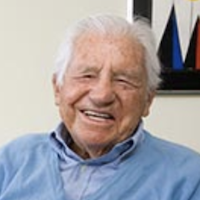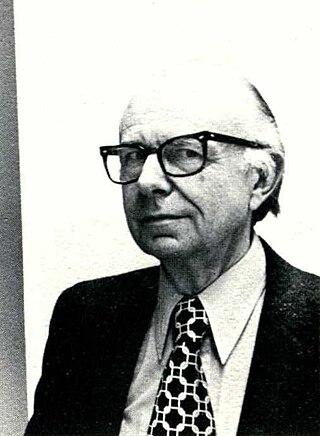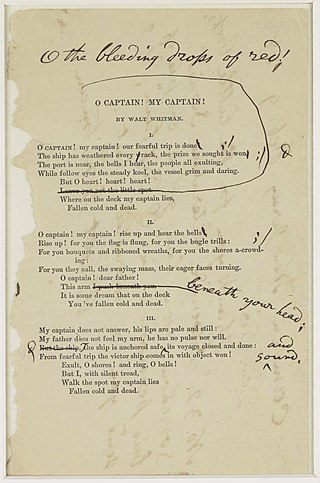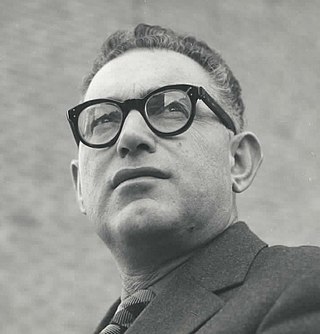Related Research Articles

Walter Whitman Jr. was an American poet, essayist, and journalist. He is considered one of the most influential poets in American literature. Whitman incorporated both transcendentalism and realism in his writings and is often called the father of free verse. His work was controversial in his time, particularly his 1855 poetry collection Leaves of Grass, which was described by some as obscene for its overt sensuality.

Leaves of Grass is a poetry collection by American poet Walt Whitman. Though it was first published in 1855, Whitman spent most of his professional life writing, rewriting, and expanding Leaves of Grass until his death in 1892. Six or nine individual editions of Leaves of Grass were produced, depending on how they are distinguished. This resulted in vastly different editions over four decades. The first edition was a small book of twelve poems, and the last was a compilation of over 400.

Michael Cunningham is an American novelist and screenwriter. He is best known for his 1998 novel The Hours, which won the Pulitzer Prize for Fiction and the PEN/Faulkner Award in 1999. Cunningham is Professor in the Practice of Creative Writing at Yale University.

Mark Strand was a Canadian-born American poet, essayist and translator. He was appointed Poet Laureate Consultant in Poetry to the Library of Congress in 1990 and received the Wallace Stevens Award in 2004. Strand was a professor of English and Comparative Literature at Columbia University from 2005 until his death in 2014.

Li-Young Lee is an American poet. He was born in Jakarta, Indonesia, to Chinese parents. His maternal great-grandfather was Yuan Shikai, China's first Republican President, who attempted to make himself emperor. Lee's father, who was a personal physician to Mao Zedong while in China, relocated his family to Indonesia, where he helped found Gamaliel University. In 1959 the Lee family fled Indonesia to escape widespread anti-Chinese sentiment and after a five-year trek through Hong Kong and Japan, they settled in the United States in 1964. Li-Young Lee attended the University of Pittsburgh, the University of Arizona, and the State University of New York Brockport.

Meyer Howard Abrams, usually cited as M. H. Abrams, was an American literary critic, known for works on romanticism, in particular his book The Mirror and the Lamp. Under Abrams's editorship, The Norton Anthology of English Literature became the standard text for undergraduate survey courses across the U.S. and a major trendsetter in literary canon formation.

David Ignatow was an American poet and editor.
Helen Hennessy Vendler is an American literary critic and is Porter University Professor Emerita at Harvard University.

"O Captain! My Captain!" is an extended metaphor poem written by Walt Whitman in 1865 about the death of U.S. president Abraham Lincoln. Well received upon publication, the poem was Whitman's first to be anthologized and the most popular during his lifetime. Together with "When Lilacs Last in the Dooryard Bloom'd", "Hush'd Be the Camps To-day", and "This Dust was Once the Man", it is one of four poems written by Whitman about the death of Lincoln.

"When Lilacs Last in the Dooryard Bloom'd" is a long poem written by American poet Walt Whitman (1819–1892) as an elegy to President Abraham Lincoln. It was written in the summer of 1865 during a period of profound national mourning in the aftermath of the president's assassination on 14 April of that year.
"Crossing Brooklyn Ferry" is a poem by Walt Whitman, and is part of his collection Leaves of Grass. It describes the ferry trip across the East River from Manhattan to Brooklyn at the exact location that was to become the Brooklyn Bridge.
David Shapiro is an American poet, literary critic, and art historian. He has written some twenty volumes of poetry, literary, and art criticism. He was first published at the age of thirteen, and his first book was published when he was eighteen.

Daniela Gioseffi is an American poet, novelist and performer who won the American Book Award in 1990 for Women on War; International Writings from Antiquity to the Present. She has published 16 books of poetry and prose and won a PEN American Center's Short Fiction prize (1995), and The John Ciardi Award for Lifetime Achievement in Poetry (2007).

Robert Friend was an American-born poet and translator. After moving to Israel, he became a professor of English literature at the Hebrew University of Jerusalem.
Alfred Corn is an American poet and essayist.

Charles Huntington Whitman was the chair of the department of English at Rutgers University for 26 years (1911–1937) and a noted scholar of Edmund Spenser and early English verse.
Arnie Kantrowitz was an American LGBT activist and college professor. He authored two books and contributed articles, essays, poems and short fiction to magazines, newspapers and anthologies.
Lee Bennett Hopkins was an American educator, poet, author, and anthologist. He was the author or editor of over 100 books for children, as well as a number of books and articles for adults.

Donald Kummings was an American professor, poet and scholar of literature, best remembered for his research on poet Walt Whitman. For 36 years he served as a professor of English at University of Wisconsin–Parkside.
Paul Zweig was an American poet, memoirist, and critic known for his study on Walt Whitman.